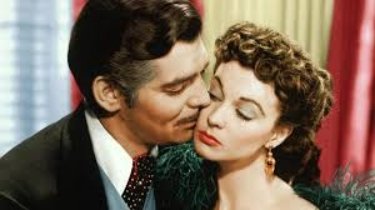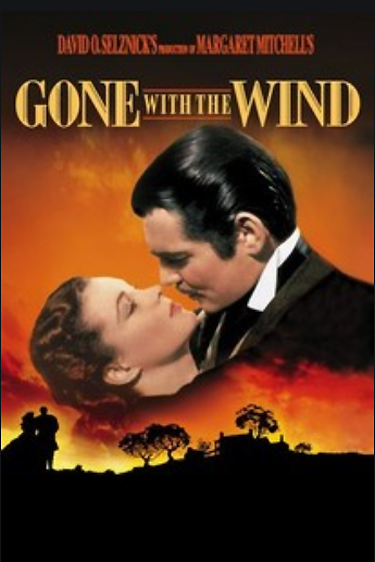Category Archive 'Margaret Mitchell'
23 Aug 2020


Turner Classics Movies is broadcasting “Gone With the Wind” (1939) tonight at 8:00 PM EST. It might be advisable to catch what may be one of the famous film’s last public viewings. Woke hysteria finds the social attitudes and language of 1939 every bit as unacceptable as those of 1859.
Today, GWTW must be presented with a warning label:
“Presented as originally released in 1939. Includes themes and character depictions which may be offensive or problematic to contemporary audiences.”
Bruce Bawer has a good essay, just out in the New Criterion, that corrects a large number of common misconceptions about the novel.
Gone with the Wind tells the story of the flirtation, lasting from the eve of the war until many years after, between Scarlett and Rhett. They’re drawn to each other, Mitchell wants us to understand, because they’re both, by nature, at odds with the social system into which they were born. If Mitchell celebrates anything, it’s not the conformist pre-war lives of planters and their families but the spirit of nonconformity exhibited by Rhett and Scarlett. During the war, the other members of their race and class are devoted heart and soul to what they describe as “the Cause.†In her account of the Atlanta bazaar, Mitchell describes the devotion of the women present to “the Causeâ€â€”“A Cause they loved as much as they loved their men, a Cause they served with their hands and their hearts, a Cause they talked about, thought about, dreamed about.†But neither Scarlett nor Rhett has any attachment whatsoever to the “Cause.†He runs Union blockades, he tells her, only to enrich himself; as for Scarlett, it’s plain from the first page that she has no attachment to the Confederacy. Toward the novel’s end, he says: “We are both scoundrels, Scarlett, and nothing is beyond us when we want something.†When Scarlett finally realizes that she loves not Ashley (the now-useless embodiment of pre-war Southern knighthood) but Rhett, she sees that “he, like her, saw truth as truth, unobstructed by impractical notions of honor, sacrifice, or high belief in human nature.†With this long-delayed self-insight, Scarlett fully embraces Mitchell’s own cold-eyed realism.
No, this is assuredly not a soggy, sentimental drama of cavaliers and chivalry, but a candid, even cynical, study of two strong-minded survivors set against the backdrop of America’s greatest social upheaval. Nor is it, as Mitchell readily and repeatedly admitted, a beautifully written book or a masterpiece of plotting. (She could never grasp why it became a bestseller or won the Pulitzer Prize.) But there’s no fictional work that paints a more sweeping and meticulous picture of the South at war, or that contains more characters of that place and time—women and men, black and white—who stir our sympathies and tremble with life. It’s a puzzlement, then, that Selznick—who in supervising the writing and rewriting of the script was almost fanatically insistent that, wherever possible, it was preferable to use dialogue from the novel rather than to write original lines—decided to frame the film with a title card that invites audiences to view the pre-war South with a romantic nostalgia that Mitchell’s book itself urges the reader to reject.
10 Jun 2020


The international hysteria over the unfortunate death of “Five-Felony-Convictions” George Floyd has produced the last straw we could all see coming: HBO-Max is pulling “Gone With the Wind” (1939) from circulation. GWTW will be joining “Song of the South” (1946) and television’s “The Amos and Andy Show” (1951-1953) on the Index Prohibitorum. Though HBO does claim the film will return in a redacted version carefully denouncing all of its sins against politically correct history. (Hollywood Reporter:)
Long considered controversial for its depiction of Black people and its positive view of slavery, Gone With the Wind faced renewed scrutiny after an op-ed by 12 Years A Slave screenwriter John Ridley published in the Los Angeles Times on Tuesday. In the op-ed, Ridley called on HBO Max to “consider removing” Gone With the Wind from its platform as the film had its “own unique problem.” “It doesn’t just “fall short†with regard to representation. It is a film that glorifies the antebellum south. It is a film that, when it is not ignoring the horrors of slavery, pauses only to perpetuate some of the most painful stereotypes of people of color,” Ridley wrote.
He added: “It is a film that, as part of the narrative of the “Lost Cause,†romanticizes the Confederacy in a way that continues to give legitimacy to the notion that the secessionist movement was something more, or better, or more noble than what it was — a bloody insurrection to maintain the “right†to own, sell and buy human beings.”
HBO Max said Gone With the Wind will eventually return to the service with a “discussion of its historical context and a denouncement of those very depictions” of Black people and slavery.
In a statement to The Hollywood Reporter, a HBO spokesperson said: “Gone With The Wind is a product of its time and depicts some of the ethnic and racial prejudices that have, unfortunately, been commonplace in American society. These racist depictions were wrong then and are wrong today, and we felt that to keep this title up without an explanation and a denouncement of those depictions would be irresponsible. These depictions are certainly counter to WarnerMedia’s values, so when we return the film to HBO Max, it will return with a discussion of its historical context and a denouncement of those very depictions, but will be presented as it was originally created, because to do otherwise would be the same as claiming these prejudices never existed. If we are to create a more just, equitable and inclusive future, we must first acknowledge and understand our history.â€
GWTW is wrong, you see, because it takes the former (now-discredited in Academia by Marxist revisionist historians) national consensus view that the South was Wrong But Romantic, fighting for a fore-doomed cause that would inevitably fail, but that Southerners’ motives were patriotic and sincere, and their conduct gallant. Even worse, GWTW portrays happy African American servants exercising plenty of domestic power and responsibility and treated as members of the family. And, on top of that, they have quaint accents, speak in distinctive and amusing vernaculars (condescension!), and all the prominent ones remain loyal to their white family, even after Emancipation! HBO knows that all this is morally unconscionable and must be factually dead wrong. Eric Fone and Ta-Nehisi Coates told them so.
Margaret Mitchell’s portrait of the Lost Antebellum South, of course, was produced by a woman born in 1900, old enough to have known personally, lived beside, and heard all her life the reminiscences of the older generation which actually lived before, fought in, and survived both the War and the glorious, now so-deeply-regretted to have ever ended, Reconstruction Period. She couldn’t possibly be right. Those Marxist historians know better.
Your are browsing
the Archives of Never Yet Melted in the 'Margaret Mitchell' Category.
/div>

Feeds
|





